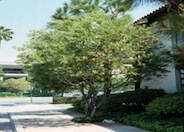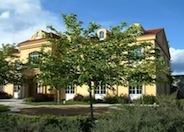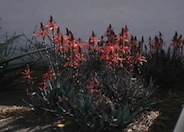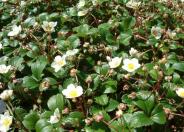
Common name:Lemon Bottlebrush
Botanical name:Callistemon citrinus
A large evergreen shrub, the Lemon Bottlebrush bears masses of bright red flowers in the spring and summer that are shaped, as the name implies, like a 'bottle brush.' New foliage grows in a bright, bronzy red.

Common name:Fruitless Mulberry, White Mulberry
Botanical name:Morus alba 'Fruitless'
Morus alba 'Fruitless' is a deciduous tree that grows 25' to 50' tall and 35' to 50' wide with glossy green leaves. It's requires low watering (drought tolerant), full sun ( tolerances heat), and will tolerate average to poor soil.

Common name:Blue Elf Aloe
Botanical name:Aloe hybrid 'Blue Elf'
This incredibly drought-tolerant plant grows into a dense mound 1 to 2' high and wide and has steel-blue foliage. It has never been known to flower. Dwarf hybrid.

Common name:Glossy Ternstroemia
Botanical name:Ternstroemia gymnanthera
This elegant evergreen shrub of medium height with dark green to bronze leaves is highly valued for its glosy, polished appearance. For proper growth, the plant should receive shade.

Common name:Shiny Xylosma
Botanical name:Xylosma congestum
This medium-sized, mounding evergreen shrub with lustrous yellow-green foliage produces new growth that is tinted rosy-red. It has a growth habit that is loose, graceful and spreading.

Common name:Beach Strawberry, Sand Strawberry
Botanical name:Fragaria chiloensis
This perennial, used as a ground cover, grows 1' high and 3' wide. It has tooth-edged, reddish green, evergreen leaves. Tiny white flowers with yellow centers appear in spring through early fall, followed by edible red fruit. This perennial can be used as a lawn replacement, in coastal areas as it tolerates sand and hot inland areas as long as it has afternoon shade. It needs regular watering. Birds love this plant.

Common name:Australian-Dracaena
Botanical name:Cordyline australis
Cordyline australis is a evergreen shrub that grows 12' to 30' tall and 10' to 15' wide with sword-like leaves. It likes full sun, and is very tolerant of heat and drought. It will live in any type of soil that is well drained. Cut back to develop multiple trunks.
Are pests bugging you? If pests are taking over there might be a good reason! Instead of grabbing that bottle of spray, consider using techniques that can solve your pest problems without toxic pesticides.
Click in the green box for more information
Designer: Sherri Osaka
Photographer: GardenSoft
Practice grass-cycling by leaving short grass clippings on lawns after mowing, so that nutrients and organic matter are returned to the soil.
Mulching and adding compost to soil can minimize evaporation and help soil absorb and store water.
Drip and other smart irrigation delivers water directly to roots, allowing no excess water for weeds.